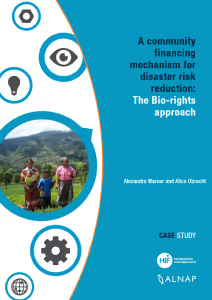A community financing mechanism for disaster risk reduction: The bio-rights approach


This case study concerns a bio-rights project carried out in partnership by CARE Netherlands and Wetlands International in western Guatemala. Bio-rights is a microcredit finance mechanism that unites community and ecosystem-based approaches to disaster risk reduction (DRR). Its innovation lies in the application of (i) combined sustainable livelihoods/ ecosystem restoration programming to reduce disaster risk; and (ii) a financial incentive mechanism used in sustainable development in a DRR context.
This is one of 15 case studies undertaken by ALNAP in partnership with Elrha’s Humanitarian Innovation Fund (HIF), exploring the dynamics of successful innovation processes in humanitarian action. The case studies examine what good practice in humanitarian innovation looks like, what approaches and tools organisations have used to innovate in the humanitarian system, what the barriers to innovation are for individual organisations, and how they can be overcome. The case studies are synthesised in the summary report, 'More than just luck: Innovations in humanitarian action'.